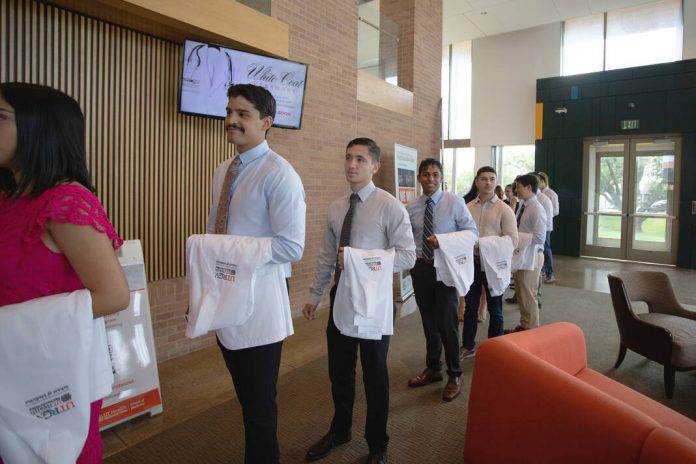
UTRGV medical school graduates wait for the White Coat Ceremony on Saturday on the campus in Edinburg.
(Mark Teiwes | UTRGV)
EDINBURG — Clad in their new white doctor’s coats, the voices of over 100 prospective doctors joined with the voices of UTRGV School of Medicine faculty and practicing physicians Saturday in reciting the Hippocratic oath, signifying the initiation of their careers in medical service.
It was, on the whole, a jovial occasion. There was a good deal of whoops and hollers.
Dr. Michael Hocker, the medical school dean who just finished his first year there, cracked a joke. This year, the school decided to have a couple of students toll the university’s old bronze bell, traditionally reserved for commencement ceremonies.
It was a bumper crop of students — 116 in all. They included members of the incoming class of 2026 and members of the class of 2024, which saw its ceremony delayed because of the pandemic.
The cheerful mood was leavened by the spirit behind that Hippocratic Oath, a commitment to service and duty.
The responsibility behind wearing that white doctor’s coat, Hocker said, is a serious charge.
“When you put on this white coat, it’s not just a uniform,” he said. “It’s your cape. It’s your cape as a superhero. You say ‘I’m not a superhero.’ You’re right, you’re not a superhero. But you’re gonna have significant impacts on the lives of those you care for. You’re gonna help those in need. You’re gonna help those that are sick get better.”
Hocker underscored the importance of the service that those prospective physicians will be providing to the Rio Grande Valley.
“Many of these students are from the Rio Grande Valley,” he said. “Many of them never would have had the opportunity to stay in the Valley to attend medical school. They would have gone off, they would have gone to other residencies. They would have likely never returned to the Valley.”
One of those Valley natives donning her white coat for the first time was Briana Gonzalez DiGrazia.
A 27-year-old McAllen native, DiGrazia has already done her share of work in the healthcare field. She recently worked as a promotora, a community health worker, helping find resources for individuals who lacked access to regular primary care.
DiGrazia also worked as a pharmacy technician at a hospital. And as a COVID-19 investigator doing contact tracing. And, briefly, at a COVID-19 testing site.
To say the least, DiGrazia has not spent her pre-med career idly. It’s also fair to say that she understands the medical impact on people’s lives Hocker was talking about.
“It’s given me a sense of what I want to do and what kind of doctor I want to be,” she said. “At first it was really frustrating to have to work through school, but honestly I think I would do it the same all over again. I’ve really enjoyed those experiences.”
Those experiences, DiGrazia said, were eye opening, especially in regard to lack of medical care. DiGrazia said she herself has experienced gaps in coverage.
“I’ve grown up in the Valley, my family is from here,” she said. “I know that there are a lot of patients in rural areas who lack access to care. I haven’t necessarily experienced it to that extent, but I know that a lot of family members, friends, have delayed care or have to try to go across the border to Mexico to get affordable care. So it’s a big issue and hopefully we can work to continue to improve that situation.”
Long term, DiGrazia says she wants to be a part of improving that situation. She hopes involving herself in academic medicine continues to expand coverage to Valley residents and reduce disparities in care.
“I really hope that in the future I can stay in the Valley, and help expand access and maybe even teach in the future, along with seeing patients,” she said. “So that way we can get more physicians in the Rio Grande Valley and hopefully improve the level of care overall.”




